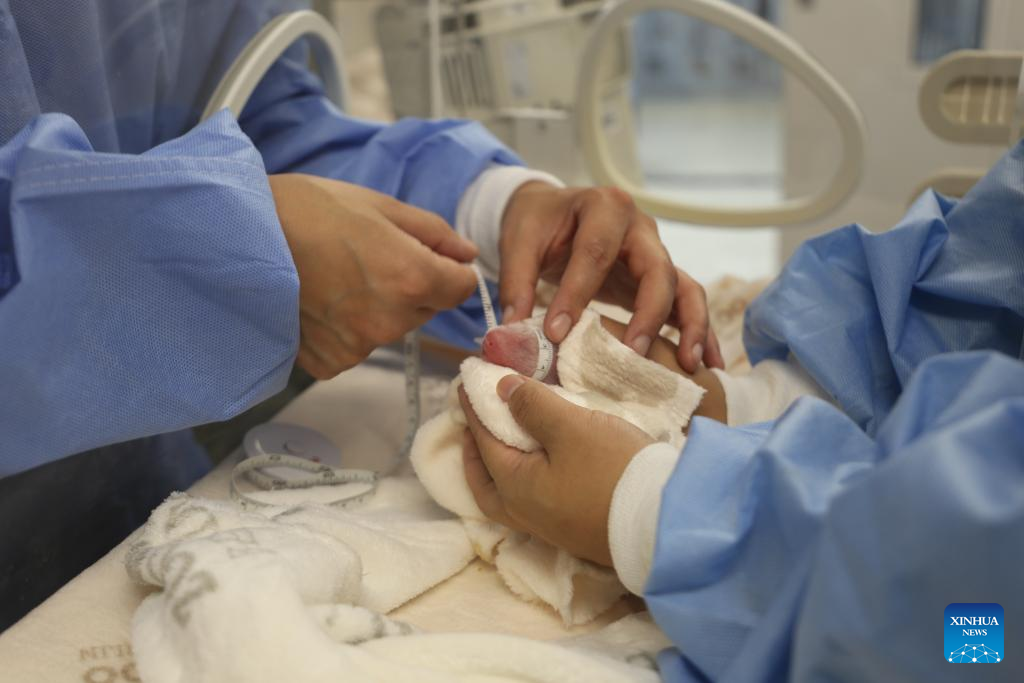
Staff members measure one of the giant panda twins at Zoo Berlin in Berlin, capital of Germany, Aug. 22, 2024. Meng Meng, an 11-year-old female giant panda at Zoo Berlin, has given birth to twins, zoo authorities announced on Friday. "The eagerly awaited second offspring of Meng Meng was born at 13:03 and 14:19 on Thursday in Zoo Berlin's Panda Garden," said the zoo in a press release. Both cubs are doing well and are lovingly cared for by their mom and the experienced panda team around the clock. The cubs weigh 169g and 136g and are about 14cm long. (Zoo Berlin/Handout via Xinhua)
BERLIN, Aug. 23 (Xinhua) -- Meng Meng, an 11-year-old female giant panda at Zoo Berlin, has given birth to twins, zoo authorities announced on Friday.
"The eagerly awaited second offspring of Meng Meng was born at 13:03 and 14:19 on Thursday in Zoo Berlin's Panda Garden," said the zoo in a press release.
Both cubs, weighing 169g and 136g and measuring approximately 14cm in length, are doing well. The zoo said the cubs now alternately drink milk with their mother every two to three hours and are otherwise cared for by the panda team in a cozy, warm incubator.
"The cubs have virtually no immune system at this stage and cannot produce essential nutrients independently of their mother, so they require an extraordinary amount of care from Meng Meng," Florian Sicks, biologist and panda curator, told Xinhua.
The zoo said the now-experienced mother knew what to do immediately after the birth. "I am relieved that the two were born healthy. The little ones seem lively and mum Meng Meng takes great care of her offspring," said Zoo and Tierpark Director Andreas Knieriem.
"She immediately took the cubs in her arms; the instinct of the mother was immediately there," said Corvin Schmohl, a caregiver with over five years of experience in panda care, in an interview with Xinhua.
UNCERTAIN SEXES, CRITICAL FIRST FEW DAYS
"Like other giant bears, giant pandas are born almost naked, deaf, blind and pink. The typical black and white panda markings only develop later. The sexes have not yet been determined with certainty," said the zoo.
The zoo emphasized the critical nature of the first few days for the newborns, noting that it will be some time before they are ready to be introduced to the public.
"Maintaining the highest standards of hygiene and a quiet environment is crucial for both the young pandas and their mother during this delicate period. For now, they won't be visible to the public," Sicks told Xinhua. "Ideally, we aim for this year."
Due to the uncertainty of the cubs' sexes, the zoo has not yet decided on their names. "Naming the cubs is a significant step, as it reflects their individual personalities. However, determining their sexes can be tricky in the early days and weeks, so we need to be certain before proceeding," Knieriem told Xinhua. "A bit more patience is needed."
Sicks described the birth as a "huge sensation," making everyone involved "very proud." "The media and the public are already showing great interest, and we are, of course, very pleased to have achieved this remarkable success in the 180-year history of the zoo," he said.
CLOSE BILATERAL COOPERATION
As giant pandas usually only raise one cub when they give birth to twins, Zoo Berlin has decided to actively assist Meng Meng in raising her cubs in close cooperation with the experts at the Chengdu Research Base of Giant Panda Breeding.
"We are delighted to have two experienced colleagues from the Chengdu Panda Base at our side to look after the cubs ... they have much more experience and are better able to assess the cubs' development," Sicks said.
Giant pandas are one of the world's most endangered species. Nearly 1,900 pandas live in the wild, mostly in the provinces of Sichuan and Shaanxi in China, rising from 1,100 in the 1980s.
Meng Meng arrived from China in 2017. In August 2019, she gave birth to the first-ever twin panda cubs, Meng Xiang and Meng Yuan, in Germany. In line with the agreement between Zoo Berlin and the China Wildlife Conservation Association, the twins returned to their hometown of Chengdu after living in Berlin for four years.
The mother was artificially inseminated on March 26 following intensive observation and careful preparation by an international team of experts. Natural mating was attempted at first.
The first signs of a successful pregnancy emerged on Aug. 11 when an ultrasound detected two heartbeats. Just 11 days later, the twins were born, following a gestation period of 149 days.
"The entire process of panda breeding involves incredibly close cooperation with Chinese experts," Sicks said, adding that the Chinese experts not only work with the German team to take care of the pandas but also teach the keepers how to provide essential support. ■
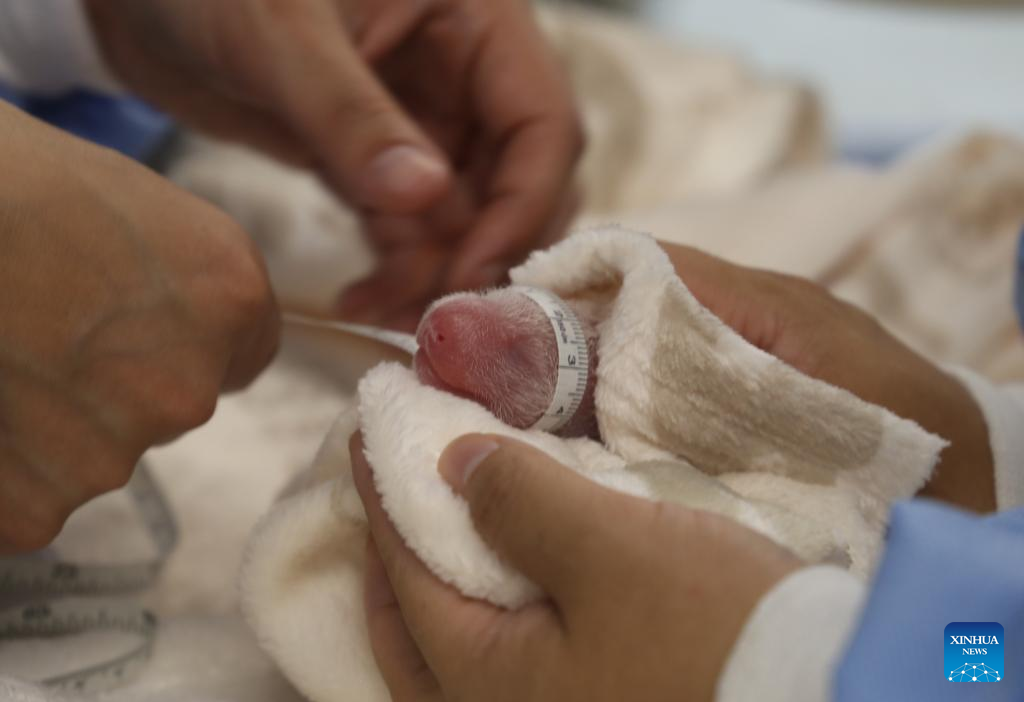
Staff members measure one of the giant panda twins at Zoo Berlin in Berlin, capital of Germany, Aug. 22, 2024. Meng Meng, an 11-year-old female giant panda at Zoo Berlin, has given birth to twins, zoo authorities announced on Friday.
"The eagerly awaited second offspring of Meng Meng was born at 13:03 and 14:19 on Thursday in Zoo Berlin's Panda Garden," said the zoo in a press release.
Both cubs are doing well and are lovingly cared for by their mom and the experienced panda team around the clock. The cubs weigh 169g and 136g and are about 14cm long. (Zoo Berlin/Handout via Xinhua)

Staff members measure one of the giant panda twins at Zoo Berlin in Berlin, capital of Germany, Aug. 22, 2024. Meng Meng, an 11-year-old female giant panda at Zoo Berlin, has given birth to twins, zoo authorities announced on Friday.
"The eagerly awaited second offspring of Meng Meng was born at 13:03 and 14:19 on Thursday in Zoo Berlin's Panda Garden," said the zoo in a press release.
Both cubs are doing well and are lovingly cared for by their mom and the experienced panda team around the clock. The cubs weigh 169g and 136g and are about 14cm long. (Zoo Berlin/Handout via Xinhua)

Staff members measure one of the giant panda twins at Zoo Berlin in Berlin, capital of Germany, Aug. 22, 2024. Meng Meng, an 11-year-old female giant panda at Zoo Berlin, has given birth to twins, zoo authorities announced on Friday.
"The eagerly awaited second offspring of Meng Meng was born at 13:03 and 14:19 on Thursday in Zoo Berlin's Panda Garden," said the zoo in a press release.
Both cubs are doing well and are lovingly cared for by their mom and the experienced panda team around the clock. The cubs weigh 169g and 136g and are about 14cm long. (Zoo Berlin/Handout via Xinhua)
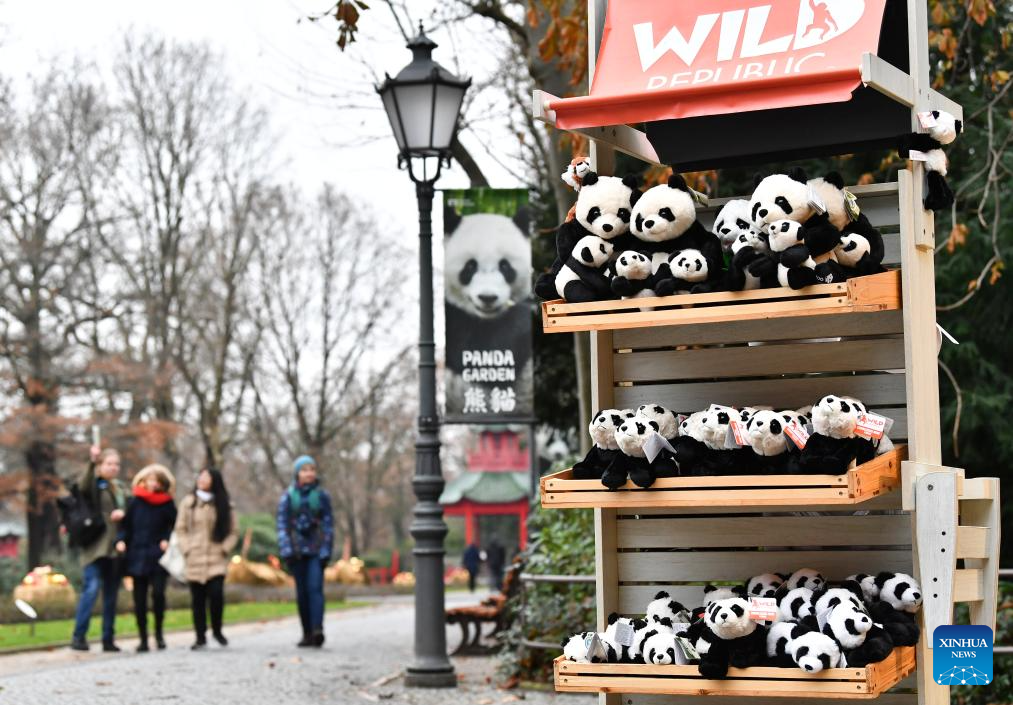
Giant panda dolls are pictured at Zoo Berlin in Berlin, Germany, Dec. 14, 2023. (Xinhua/Ren Pengfei)
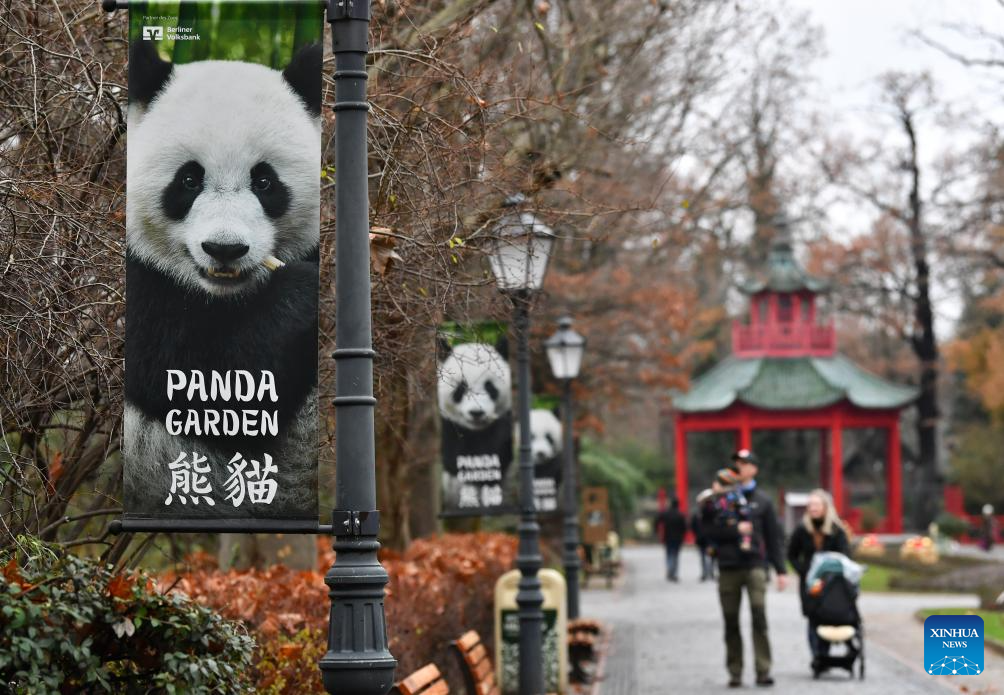
Posters of giant panda are pictured at Zoo Berlin in Berlin, Germany, Dec. 14, 2023. (Xinhua/Ren Pengfei)
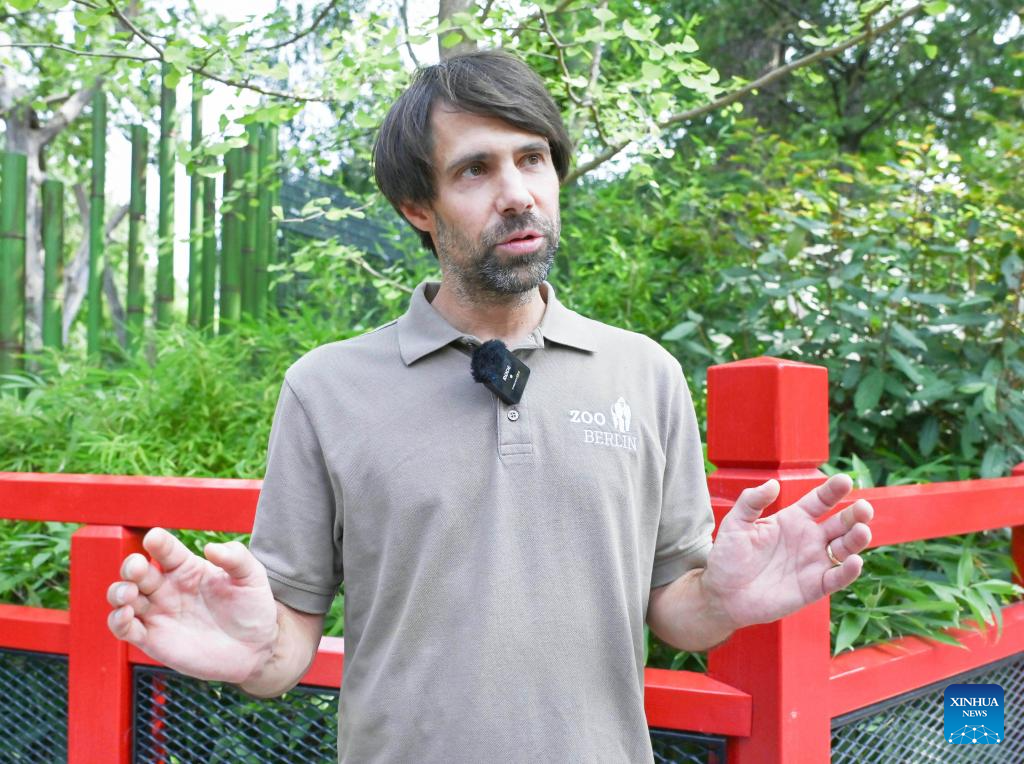
Biologist and panda curator Florian Sicks speaks to media at Zoo Berlin in Berlin, Germany, Aug. 23, 2024. (Xinhua/Ren Pengfei)
